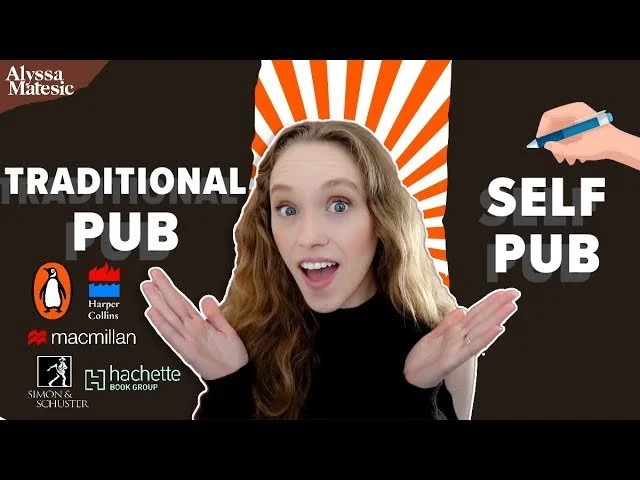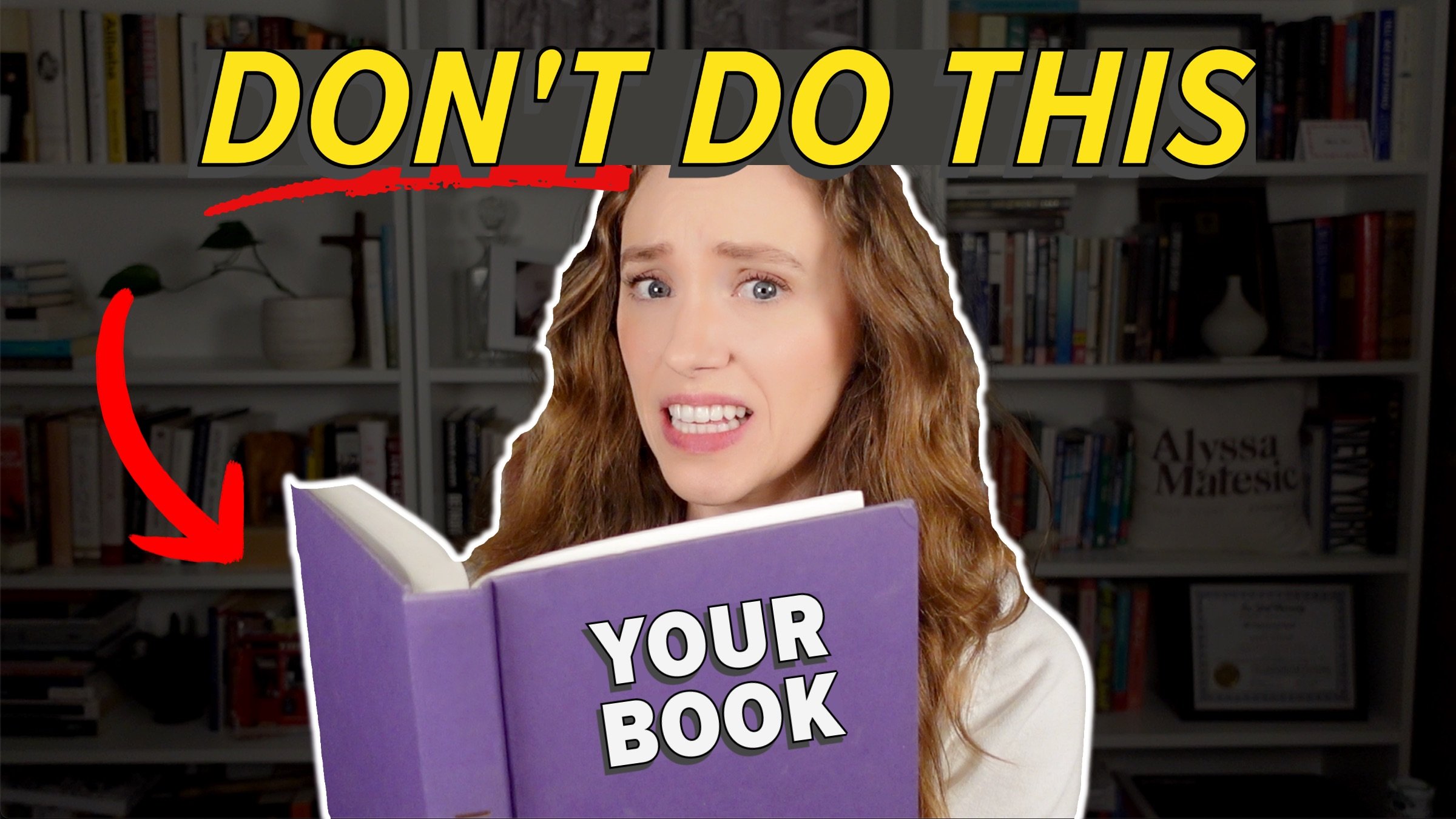Traditional Publishing vs. Self-Publishing: 5 Factors to Help You Choose
HIT PLAY OR READ THE POST BELOW:
There are two main paths to publication that most authors follow: traditional publishing and self-publishing. But they offer vastly different experiences, so it's important for you to consider both options and determine what is best for your book and your specific situation.
You'll find many people online touting either that traditional publishing is superior or that self-publishing is the only viable path. But the truth is that there is no “right” way publish. No publishing option is better or worse than another; each offers its own pros and cons, and every author needs to determine for themselves what makes the most sense.
Here are five factors you need to consider as you're deciding between traditional publishing vs. self-publishing. My goal is for you to make an informed decision that best positions your book for success.
A little bit of background about me: I used to work in the traditional publishing industry at Penguin Random House and at a top literary agency. Now, as a professional developmental editor, I work with authors who self-publish and who traditionally publish.
1. Your Publishing Goals
The first factor to consider when you're thinking about traditional publishing vs. self-publishing is your personal goals for this publication. How important is it to you to see your book on the shelf at a brick-and-mortar bookstore? If it's very important to you, then traditional publishing is the tried-and-true method for getting your book stocked at major retailers. That's because traditional publishers have large distribution networks and have relationships with bookstores. So, if broad market reach is very important to you, traditional publishing might be the path to consider.
When you're self-publishing, you are responsible for your own distribution. It's certainly not impossible for you to get your book stocked in bookstores, particularly at local indie bookstores. But you will have to be the one initiating those conversations about inventory with booksellers. Because of this, eBook platforms like Amazon's Kindle Direct Publishing are extremely popular options for self-publishing authors. When publishing through a platform like that, you will typically be focusing on online sales versus in-person bookstore sales.
Another thing to ask yourself is how important is prestige to you when it comes to publishing your book? There is a certain level of clout and credibility that comes when you publish with a traditional publisher. That's because it's highly competitive, and you have to go through several layers of gatekeepers to get your book published by a publishing house. That means that people are pretty impressed if they hear that you've been published by one, especially if you're published by one of the Big Five publishing houses. It's similar to how people are typically impressed if they hear you went to an Ivy League college. So, if credibility and validation matter to you, traditional publishing may be a better option.
With self-publishing, there are no particular barriers to entry. Anyone who puts together a book and wants to put it online via a publishing program like Amazon's can do it. There are no gatekeepers in that realm.
2. Costs
With traditional publishing, the publishing house is going to offer you an advance, which is a sum of money that you earn no matter how many copies your book sells. It could sell one copy, and you still get to keep all of that money the publishing house gave you. Also, the publishing house is going to cover all of the production costs related to the book, including packaging, cover design, editing, marketing, so you will not be paying anything upfront. However, you are going to earn lower royalty rates, which is the percent earnings you make as the author on every book sold, and you are not going to see royalty payments come through until the royalties that you earn total the advance that the publisher has already paid you.
With self-publishing, you are going to retain a much larger share of the royalties on every book sold. They may vary a bit depending on the platform that you choose, but remember that you are going to bear all of the upfront costs related to editing, cover design, marketing, etc. And to create a book that is successful and entices readers, you do want to invest in high-quality professional services. It's unlikely that your book is going to sell very well if you don't have a professional-looking cover or you don't have strong editing to make sure that the pages are polished and on par with traditionally published books. So, with self-publishing, you need to consider how much you have to invest in this book project. Many self-published authors end up spending several thousand dollars to put out a high-quality book, so take a close look at your budget. Of course, you can self-publish for more or for less, but that's a general range.
3. Your Timeline
When you're deciding between traditional publishing vs. self-publishing, you must consider your timeline. How urgently do you want to see your book published, and how important is adhering to that timeline to you?
The traditional publishing process may take longer than you expect because it typically requires you to first get a literary agent, and the querying process can take anywhere from a few months to a year or more. Then your agent has to pitch your book to publishing houses, which can also take several months. Then, once you sign a book deal with a publishing house, they will typically slot your book for publication anywhere from one to two years from that moment. That's because it takes a long time on the publisher's end to get everything in order, design the book, edit the book, make the cover art, etc. So, all in, you're looking at a bare minimum of one to two or more years for the traditional publishing route.
With self-publishing, the timeline is mostly within your control, which can be very enticing. But you still shouldn't rush the process to publish the book as soon as possible. I encourage you to take the time to make sure it's the highest possible quality book you can put out there. You want the book to be professionally presented, and frankly, you owe it to your book to present it that way. So, although you will be able to set your own publication date, if you find the process needs to take a bit more time to put out a high-quality book, I recommend taking that time and pushing out your publication if you can.
4. Genre and Audience
Traditional publishers tend to look for books that fall within standard genre categories, which are those that you will see at major bookstores. And each of those genres also comes with certain length expectations. So, if your book deviates substantially from the norm, it's going to be harder for you to pursue traditional publishing. It's not necessarily impossible by any means, as publishers do like to take on works that are different or experimental if the story and writing are very strong. But it will likely be harder for you to find a literary agent and get a publishing deal if you're interested in specific genres that publishers typically aren't as interested in. Novellas, which are less than 40,000 words, or stories that are upwards of 150,000 words are also going to be more challenging to present to publishing houses.
For self-publishing, there are no specific genre or length restrictions. You can put up any length book, any genre book that you'd like. But it still helps to think about who your audience is, especially if your goal is to sell a substantial number of books. If you have a built-in audience that relates to the book you're putting out, that can be extremely helpful for either traditional publishing or self-publishing.
For instance, if you own a bakery and you are publishing a cookbook, that's a built-in set of people who are likely going to be interested in your book. Platform is something to think about seriously if you are going the self-publishing route because, again, the marketing is going to be all on you. If you're able to build a network of people who are interested in your writing and your book, that's going to help you sell books much more easily.
Traditional publishers, especially the Big Five, are looking for books that have a pretty broad market appeal. Ideally, your book will have a clear, identifiable audience that is substantial enough to make significant sales and profit. So, if your book is super niche and only likely to appeal to a very small group of people who are interested in a very particular topic, then publishers might not see enough commercial appeal for it to have that wider audience.
5. The Role You Want to Play
The final factor to consider when you're thinking about traditional publishing vs. self-publishing is the role you want to play as the author. Do you like working in a team or pursuing projects on your own?
In traditional publishing, you're going to have the support of various teams within the publishing house, including the editorial team, the production team, the design team, the marketing and publicity team, the sales team, etc. But that also means that there are more cooks in the kitchen, and there might be certain compromises that you have to make or tough conversations that you might have to have with your publishing team. But it helps to remember that you all have the same goal, which is to make the most book sales possible. Your publisher wants that, and you want that. But you do have to have somewhat of a collaborative spirit when you go the traditional publishing route.
Self-publishing is much more independent and hands-on, because you're going to be fully responsible for all aspects of the book's publication. You're likely going to have to learn about a lot of elements of book publishing that you may not know about already. So, if you enjoy that level of involvement and want to learn new skills as it relates to book publishing, then self-publishing could be a good fit.
I hope this helped you understand the core differences between traditional publishing and self-publishing and what factors to think about when choosing your own publishing path. Thanks so much for reading, and happy writing!






